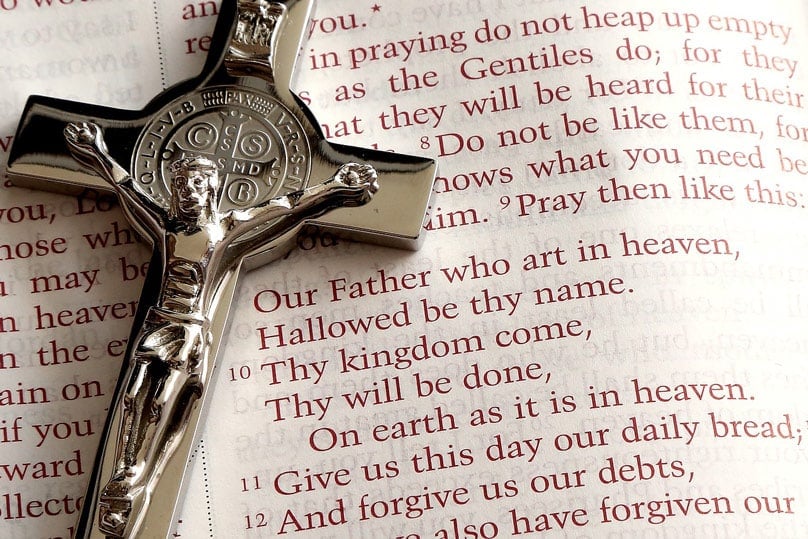Does Pope Francis Want To Change The Lord's Prayer
Reading Time: iii minutes

"In the past few weeks several friends have told me that the Pope has changed the wording of the Our Father. Is this true and, if then, what is the new diction?"
It is not true that the Pope has inverse the Our Begetter, although he has said something virtually it. The facts as they unfolded are the following.
Get-go, the French bishops adopted a new translation of the Lord's Prayer in the Roman Missal which went into effect on the first Dominicus of Advent 2018. The translation changed "lead u.s.a. not into temptation" to the French equivalent of "do not permit the states fall into temptation."
Sometime later Italian idiot box aired an hour-long interview with Pope Francis in which he was asked near the new translation.
He commented: "It'southward me who falls. Information technology'south not Him who pushes me into temptation, every bit if I roughshod. A male parent doesn't exercise that. A begetter helps you to get up right away. The one who leads into temptation is Satan."
What the Pope says is true. God does not lead us into temptation; the devil does. But "lead us not into temptation" are the words Our Lord himself gave the apostles when he taught them the Our Father (cf. Mt 6:13) and they are the words we have used in English language ever since. Both the Greek and the Latin can be translated equally "lead us not into temptation."
St Jerome'south Latin Vulgate Bible translation, taken from the Greek, is "ne nos inducas in tentationem", which is literally "lead us non into temptation."
As regards to the Greek, the Canon of the Catholic Church teaches: "This petition goes to the root of the preceding one, for our sins result from our consenting to temptation; we therefore ask our Father not to 'lead' us into temptation.

It is difficult to interpret the Greek verb used by a single English discussion: the Greek means both 'exercise non let united states of america to enter into temptation' and 'do not allow u.s. yield to temptation'" (CCC 2846).
Thus the words "pb us not into temptation" are to be understood in the sense of asking God not to allow us autumn into temptation. In the words of the Canon: "We inquire him [God] not to allow us to take the way that leads to sin. We are engaged in the battle 'between flesh and spirit'; this petition implores the Spirit of discernment and force" (CCC 2846).
More recently, at the get-go of June 2019, Pope Francis approved the translation of the 3rd edition of the Roman Missal prepared by the Italian bishops' conference. This translation, like the French, has changed the wording of the Our Father, in this case to "do non abandon us to temptation".
Then to appointment Pope Francis has approved new translations of the Lord'due south Prayer in the missals of two countries. He has not changed the translation for the whole world.
Information technology is for the bishops of each language group to propose the alter, which must be approved past the Holy See.
Equally regards to the English, the translation of the third edition of the Roman Missal was issued back in 2011 and it is the one nosotros employ at nowadays. Information technology has the traditional rendering of the Our Father with its somewhat old-fashioned diction, with expressions similar "hallowed exist thy name" and "thy kingdom come."
The thinking of the English-language bishops was obviously that the words of the Our Father are so traditional and familiar that they should non exist changed.
But is this translation too nigh to modify? A spokesperson for the bishops of England and Wales has said that the International Committee on English in the Liturgy (ICEL) "is not currently considering the Lord'due south Prayer," and that "there are no plans at present for [the Our Male parent] to alter in English."
A spokesperson for the Scottish bishops said at that place were no plans to prefer the changes, while the Irish bishop in charge of liturgy said that, "In consultation with bishops from other English-speaking countries, the Irish gaelic Catholic Bishops' Conference will give close attending to the reported change to the Lord's Prayer. The bishops volition look at the implications for both the Irish and English language translations of this much loved and universal prayer."
In the meantime nosotros will keep to say the Our Father both in Mass and in our personal prayers in its traditional grade.
Related stories:
- Aussie bishops off to Rome
- Pope Francis gives the go-ahead for Australia'southward Plenary Quango
- Church'due south abuse cover-up days over
Source: https://www.catholicweekly.com.au/qa-with-fr-john-flader-changing-the-lords-prayer/
Posted by: haleysoccut.blogspot.com

0 Response to "Does Pope Francis Want To Change The Lord's Prayer"
Post a Comment